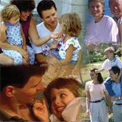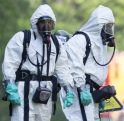SUMMERTIME MEANS MORE MOSQUITOES, TICKS: Use precaution!
Posted June 12, 2015 by NCHD Admin
Summertime means more mosquitoes and ticks: Use precaution! Along with summer fun, we all run the risk of becoming sick from Vector-Borne Diseases.
The North Central Health District and local county health department would like to remind Middle Georgia residents to take precautions against mosquito-related illnesses, such as West Nile Virus (WNV) and Eastern Equine Encephalitis (EEE) as well as tick-related diseases, such as rocky mountain spotted fever. Mosquito and tick-borne diseases are most active late spring through early fall in Georgia. Increased numbers of human cases are normally detected in August.
Dr. David Harvey, District Health Director, said, “This is the time of year when Public Health begins to receive reports of diseases such as West Nile Virus and Rocky Mountain Spotted Fever. We encourage area physicians to check anyone with symptoms that may resemble a mosquito or tick-borne illness.”
District epidemiologist, Amber Erickson, says that while there have been no recently reported cases of WNV this year, we typically start getting reports during the summer months. WNV can be spread to humans by mosquitoes that feed on infected birds and then bite humans. Most people bitten by infected mosquitoes do not get sick. Those who do get sick from WNV often suffer a mild flu-like illness and recover without treatment. In rare cases, WNV can cause serious illness such as encephalitis (inflammation of the brain) or meningitis (inflammation of the lining of the brain and spinal cord). These severe cases, which are more likely to occur in people aged 50 or older, may be fatal. Less than 1 percent of people infected with WNV develop serious illness such as encephalitis or paralysis. People who have chronic medical conditions are at greater risk of developing severe illness if infected with WNV.
Erickson says, “Tick-borne diseases seem to be prevalent this year as our office continues to receive reports of diseases like Rocky Mountain Spotted Fever. In addition to watching out for mosquitoes, people should also be mindful to prevent tick bites.”
If you become ill within 30 days after being bitten by a tick or exposure to tick-infested areas, see your doctor. Common symptoms of tick-borne disease include: fever, rash, muscle pain, weakness and headache. Tick-borne diseases can be treated with antibiotics, but early treatment is important. Serious illness, such as meningitis, or death can occur if not treated promptly.
This year, public health officials are also concerned with Chikungunya. Chikungunya is caused by a virus that spreads through mosquito bites. It is not spread through human to human contact.
The most common symptoms of chikungunya are fever and severe joint pain, especially in the hands and feet. Other symptoms may include headache, muscle pain, joint swelling or rash. Symptoms usually begin three to seven days after being bitten by an infected mosquito, with most patients feeling better within a week. Joint pain, however, can persist for months.
Since 2014, Chikugunya cases have been reported in Georgia among travelers returning from affected areas in the Americas and local transmission has been identified in Florida, Puerto Rico, and the U.S. Virgin Islands which include: Saint Croix, Saint John and Saint Thomas. Mosquitoes that carry Chikugunya virus bite during the day and at night, indoors and outdoors, and often live around buildings in urban areas. Anyone who has symptoms of Chikugunya following travel should seek medical attention and make their healthcare provider aware of any travel history outside of the country.
All mosquito and tick-borne diseases can be prevent by practicing the “Five D’s of Prevention.”
- Dusk/Day/Dawn – Mosquitoes carrying WNV usually bite at dusk and dawn, so avoid or limit outdoor activity at these times. Mosquitoes carrying Chikungunya virus bite during the day.
- Dress – Wear loose-fitting, long-sleeved shirts and pants to reduce the amount of exposed skin.
- DEET – Cover exposed skin with an insect repellent containing DEET.
- Drain – Empty any containers holding standing water because they can be excellent breeding grounds for virus-carrying mosquitoes.
- Doors – Make sure doors and windows are in good repair and fit tightly, and fix torn or damaged screens to keep mosquitoes outside.
For more information, visit http://dph.georgia.gov/mosquito-borne-viral-diseases or ask your physician.


 Contact Us
Contact Us Locations
Locations Job Openings at North Central Health District
Job Openings at North Central Health District Internships
Internships Board of Health
Board of Health Cost and Insurance
Cost and Insurance Privacy Policy
Privacy Policy Teens & Adults
Teens & Adults For Children
For Children Other Programs
Other Programs County Environmental Health Offices
County Environmental Health Offices Chemical Hazards
Chemical Hazards Tourist Accommodations
Tourist Accommodations Food Service
Food Service Rabies Control
Rabies Control Lead Poisoning Prevention
Lead Poisoning Prevention Body Art
Body Art Land Use
Land Use Swimming Pool Program
Swimming Pool Program Water Testing for Private Wells
Water Testing for Private Wells Environmental Health Complaints
Environmental Health Complaints Georgia Food Recall Alerts
Georgia Food Recall Alerts Personal & Family Preparedness
Personal & Family Preparedness Emergency Preparedness for Functional & Access Needs
Emergency Preparedness for Functional & Access Needs Severe Weather Preparedness
Severe Weather Preparedness Emergency Preparedness Training
Emergency Preparedness Training Medical Reserve Corps
Medical Reserve Corps Regional Healthcare Coalitions
Regional Healthcare Coalitions Strategic National Stockpile/Medical Countermeasures
Strategic National Stockpile/Medical Countermeasures